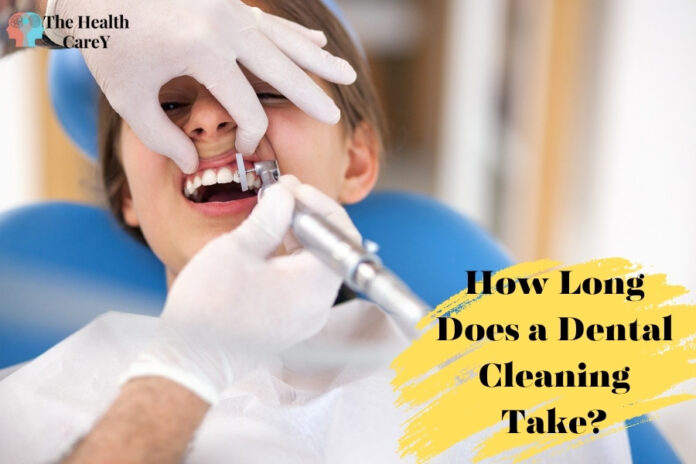When it comes to maintaining good oral health, dental cleaning is an essential part of your routine. However, how long does a dental cleaning take? The answer to this question depends on factors such as your oral health, the cleaning you need, and the dentist or hygienist’s approach.
Typically, a routine dental cleaning takes between 30 minutes to an hour. During this time, your dental hygienist will remove plaque and tartar buildup from your teeth and polish them to give them a clean, smooth finish. However, if you have extensive tartar buildup or gum disease, you may need a deep cleaning, which can take up to four hours and require multiple appointments.
How Long Does a Dental Cleaning Take?
If you plan to visit a dentist for a dental cleaning, you might wonder how long the procedure will take. The duration of a dental cleaning can vary based on several factors. In this section, we’ll discuss what dental cleaning entails and what factors can affect the length of the procedure.
What is a Dental Cleaning?
A dental cleaning, also known as a teeth cleaning, is a preventive dental procedure that involves removing plaque, tartar, and stains from your teeth. During a dental cleaning, a dental hygienist or dentist will examine your teeth and gums, polish your teeth, and remove any buildup of plaque or tartar.
The dental cleaning procedure typically involves the following steps:
- Examination: The dental hygienist or dentist will examine your teeth and gums to check for any signs of decay, gum disease, or other dental problems.
- Polishing: The dental hygienist or dentist will polish your teeth using a special dental instrument to remove stains or discoloration.
- Scaling: The dental hygienist or dentist will use a dental scaler to remove any plaque or tartar buildup from your teeth.
- Root Planing: If you have deep gum pockets or signs of gum disease, the dental hygienist or dentist may perform root planing to remove the buildup of bacteria and help your gums heal.
- X-ray: If necessary, the dentist may recommend taking an X-ray to check for any hidden dental problems.
Factors Affecting the Length of a Dental Cleaning
The length of a dental cleaning can vary based on several factors, including:
- The extent of dental plaque and tartar buildup on your teeth
- The sensitivity of your teeth and gums
- The presence of gum pockets or signs of gum disease
- The need for X-rays or other dental tests
On average, routine dental cleaning can take between 30 to 60 minutes. However, the cleaning may take longer if you have a lot of plaque buildup or need additional dental procedures. For example, if you require root planning or scaling, the procedure can take several hours and require multiple appointments.
In addition, if you have sensitive teeth or gums, the dental hygienist or dentist may need to take extra care and spend more time on certain areas of your mouth, which can also affect the length of the procedure.
In conclusion, the length of a dental cleaning can vary based on several factors. However, routine dental cleaning can take 30 to 60 minutes on average. If you have any concerns or questions about the procedure length, talk to your dentist or dental hygienist beforehand.
The Dental Cleaning Process
When you visit your dentist for a professional teeth cleaning, you can expect the process to involve several steps. Here’s what you can expect during your dental cleaning:
Step 1: Examination
Your dental hygienist will examine your mouth to check for any signs of gum disease, gingivitis, periodontitis, or oral cancer. They will also look for any areas of plaque or tartar buildup.
Step 2: Plaque and Tartar Removal
Next, your hygienist will use an ultrasonic scaler or handheld instruments to remove any plaque and tartar buildup from your teeth. This process is important to prevent gum disease and tooth decay.
Step 3: Teeth Polishing
After plaque and tartar removal, your hygienist will polish your teeth using special toothpaste and a rotating brush. This helps to remove any surface stains and leaves your teeth feeling smooth and clean.
Step 4: Fluoride Treatment
Finally, your hygienist may apply a fluoride treatment to help remineralize your teeth and prevent tooth decay. This treatment involves applying a fluoride gel or varnish to your teeth and allowing them to sit for a few minutes before rinsing them off.
Overall, a dental cleaning typically takes 30 minutes to an hour, depending on the extent of plaque and tartar buildup. Regular dental checkups and professional teeth cleanings are important for maintaining good oral health and preventing dental problems in the future.
Deep Cleaning vs. Regular Cleaning
When you visit your dentist, you may hear “deep cleaning” and “regular cleaning.” What is the difference between the two, and which is right for you? Let’s take a closer look.
Regular Cleaning
Regular cleaning, or prophylaxis, is a routine cleaning recommended twice yearly for most patients. During a regular cleaning, your dental hygienist will use special tools to remove plaque and tartar from your teeth and gum line. They will also polish your teeth to remove surface stains and give them a smooth, shiny finish.
Regular cleanings are important for maintaining good oral health and preventing cavities and gum disease. They are usually quick and painless, and most patients do not experience any discomfort during or after the procedure.
Deep Cleaning
Deep cleaning, also known as scaling and root planing, is a more intensive cleaning procedure recommended for patients with gum disease or other oral health issues. During a deep cleaning, your dental hygienist will remove plaque and tartar from below the gum line, where regular cleanings cannot reach. They will also smooth out rough spots on the roots of your teeth to prevent bacteria from accumulating.
Deep cleanings may be done all at once or divided into several appointments, depending on the extent of the cleaning needed. They can take anywhere from one to four hours, depending on the number of quadrants that need to be cleaned.
While deep cleanings can be uncomfortable, they are important in treating gum disease and preventing tooth loss. They may also help reduce tooth sensitivity and inflammation in the gums.
Regular cleanings are important for maintaining good oral health, while deep cleanings are necessary for treating gum disease and other health issues. Your dentist can help you determine which cleaning is right for you based on your needs and oral health history.

What to Expect During a Dental Cleaning
When you go in for a dental cleaning, you can expect the process to take anywhere from 30-60 minutes. Here is what you can expect during your appointment.
Pain Management Options
If you experience discomfort during the cleaning, your dentist may offer you a pain reliever such as ibuprofen. Sometimes, your dentist may use a local anesthetic to numb the cleaned area.
Soreness
After the cleaning, you may experience soreness in your gums and teeth. This is normal and should subside within a few days. If the soreness persists, contact your dentist.
Post-Cleaning Care
To maintain your clean teeth and gums, it is important to continue practicing good oral hygiene habits at home. This includes brushing twice a day, flossing daily, and using mouthwash. Your dentist may also recommend a follow-up appointment in six months to ensure your teeth and gums remain healthy.
Dental cleaning is a routine procedure important for maintaining good oral health. Knowing what to expect during the process makes you feel prepared and confident during your appointment.
Dental Cleaning Frequency
Regular dental cleanings are an essential part of maintaining good oral health. But how often should you get your teeth cleaned? Here are some things to consider.
Recommendations for Dental Cleaning Frequency
The American Dental Association recommends that you visit a dentist at least once a year for a professional cleaning. However, depending on their needs, some people may need to go more frequently.
Your dentist or dental hygienist can help you determine how often you should get your teeth cleaned based on factors such as:
- Your age
- Your oral health history
- Your current oral health status
- Whether you have any underlying medical conditions that affect your oral health
You can go longer between cleanings if you have good oral health and a low risk of developing dental problems. However, you may need to go more frequently if you have a history of gum disease or other oral health issues.
Insurance Coverage for Dental Cleanings
Most dental insurance plans cover at least one cleaning per year. However, some plans may cover more frequent cleanings if you have a documented history of dental problems.
It’s important to check with your dental insurance provider to see what your plan covers. Remember that some plans may require you to pay a portion of the cost of the cleaning out of pocket.
If you don’t have dental insurance, you may still be able to get affordable dental cleanings through community health clinics or dental schools. Some dentists also offer discounts or payment plans for uninsured patients.
In summary, regular dental cleanings are important to maintaining good oral health. Talk to your dental professional to determine how often you should get your teeth cleaned based on your needs. Check with your dental insurance provider to see what your plan covers, and explore other options if you don’t have insurance.
Conclusion
In conclusion, dental cleanings are essential to maintaining good oral health. The length of a dental cleaning can vary depending on the extent of the cleaning needed. A typical dental cleaning for someone with good oral hygiene can take 30-45 minutes. In contrast, a more extensive cleaning that involves tartar removal can take several hours and may be spread over multiple appointments.
It is important to note that the length of the cleaning can also depend on the sensitivity of the areas being cleaned. Sensitive areas may require more time and attention to ensure they are thoroughly cleaned without causing discomfort to the patient.
Regular dental cleanings, at least once every six months, can help prevent gum disease and tooth decay. During a cleaning, the hygienist will remove plaque and tartar buildup, which can lead to these dental issues if left untreated.
Patients nervous about the cleaning procedure can request to be done under IV sedation, which can help them feel more comfortable and relaxed during the process.
Dental cleanings are important to maintaining good oral health and should not be overlooked. By keeping up with regular cleanings, you can help prevent dental issues and keep your smile healthy and bright.
Also Read:





















